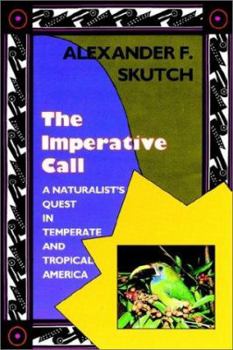Imperative Call
Select Format
Select Condition 
Book Overview
" The Imperative Call explores the making of an extraordinary naturalist... No one since W. H. Hudson has approached nature from such a consistent moral position. No one has tried so scrupulously to define the murky boundary 'between science and vandalism...' Ultimately, the reader comes to see Alex Skutch not so much as a naturalist or a farmer but as an artist."-- Audubon magazine "Skutch offers us the botanical and zoological riches of the tropics, combining a gifted scientist's powers of observation with a committed humanist's reverence for life. Even those who have never been drawn to the tropics will find themselves entranced." -- American Birds In The Imperative Call , Alexander F. Skutch recounts his early years growing up in Maryland and Maine and his adventures in Central America and Jamaica during the 1920s and 1930s, well before modernization affected the region, when the began his classic studies of nesting birds. Weaving precise descriptions of tropical plan, bird, and animal life into a personal philosophy about man and nature, the book is both autobiography and natural history.
Format:Paperback
Language:English
ISBN:0813011493
ISBN13:9780813011493
Release Date:February 1980
Publisher:University Press of Florida
Length:341 Pages
Weight:0.05 lbs.
Dimensions:0.8" x 5.9" x 9.0"
Customer Reviews
1 rating
Stories of a lost Paradise
Published by Thriftbooks.com User , 17 years ago
Dr. Alexander Skutch passed away in 2004 just short of his 100th birthday. He was an acclaimed biologist and had published a multitude of studies, articles and books on tropical botany, nature and ornithology. In this book he describes his early days in Costa Rica just after concluding his work with the banana producing companies in the 1930's. In 1941 he purchased a farm in the rich San Isidro Valley in the South Central part of the country and named it Los Cosingos after the Fiery-billed Aracari, a species of Toucan that was common in the area. Skutch then devoted his time to studying the birds and plants of the area and worked to save some of the forests and preserves of the country. He along with Dan Janzen were two of the most influencial biologists that helped Costa Rica shape a system of national parks that may be the best of any country in the world. In this book Skutch writes of the early days on the farm, what the area was like before the main rush of settlers and how it changed into an agricultural center. His farm, or better called his sanctuary is the last forest left in the area and still shelters many of the birds, animals and plants once found in the valley before it changed to cropland. He describes journeys across the Cerro Muerte before the road was built when there was just a horse trail, and travelers would sometimes freeze on its heights here in the tropics. He describes fantastic natural phenomena such as migrations of irridescent winged butterflys that stretched from horizon to horizon that sadly dwindled with time and are no more. I had noticed that no one had reviewed this book which I imagine is an indicator of the present interest in this book. This is very unfortunate as it is an excellent read and will illuminate aspects of tropical life that have all but disappeared in Central America.





